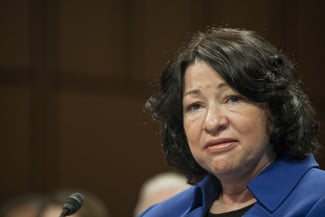Sotomayor Supports Cert for Defendant Convicted Without Notice of Trial

Justice Sonia Sotomayor. K2 images / Shutterstock.com
Justice Sonia Sotomayor argued on Monday that the U.S. Supreme Court should have granted cert in the case of a man convicted after notice of trial was sent to the wrong address.
The defendant, William Fairey, was tried and convicted in absentia in South Carolina after his arrest on a charge of obtaining goods and money under false pretenses, Sotomayor wrote in a dissent (PDF) from the court’s cert denial. Fairey was sentenced to eight years in prison.
Fairey had informed the court of new addresses in California and Florida, but the subpoena for trial was sent only to addresses in California and South Carolina. The Florida address was Fairey’s most recent residence, and his most recent motion to the court had provided only the Florida address. He never received actual notice of trial.
The facts “do not remotely demonstrate” a waiver of the right to be present for trial, Sotomayor said. “A trial conducted without actual notice to a defendant and in his absence makes a mockery of fair process and the constitutional right to be present at trial. That is particularly true where, as here, the defendant participated actively in his defense and kept the state informed of his whereabouts.”



